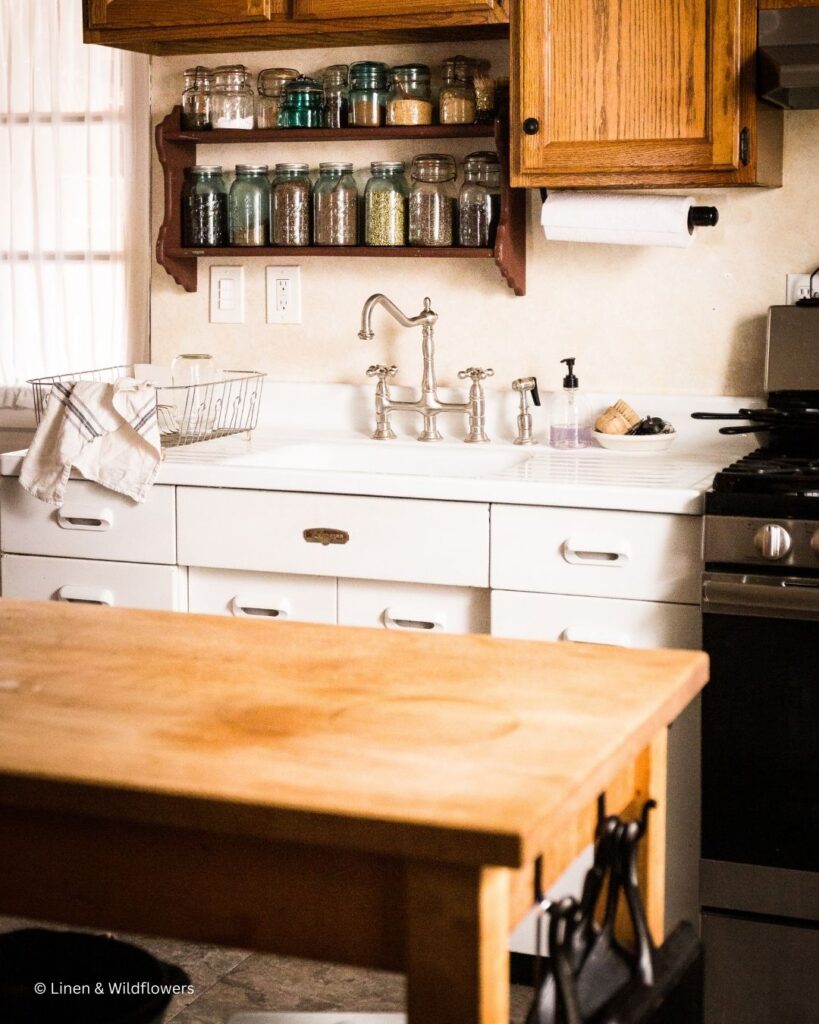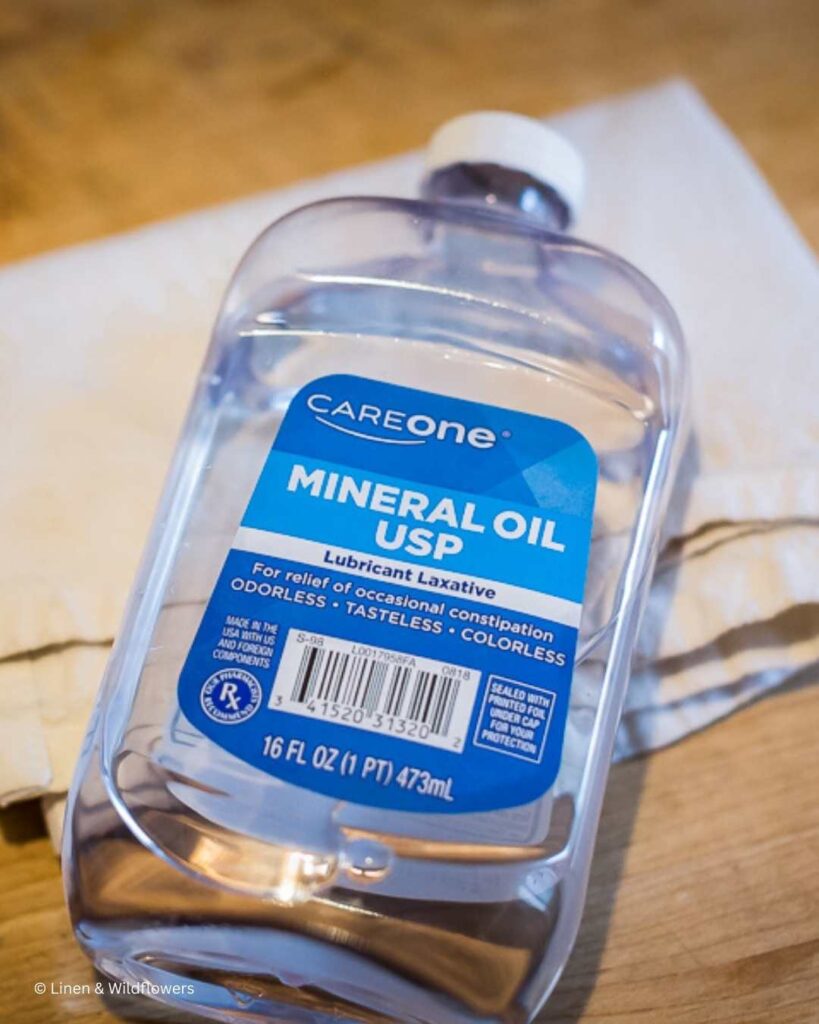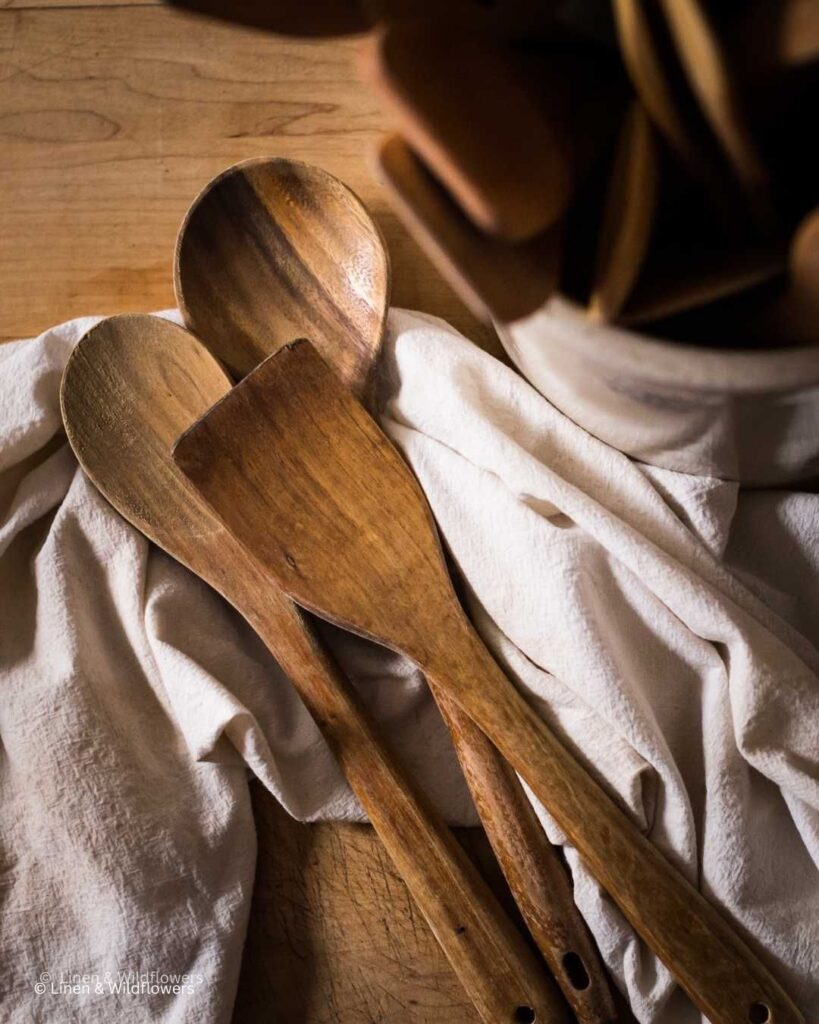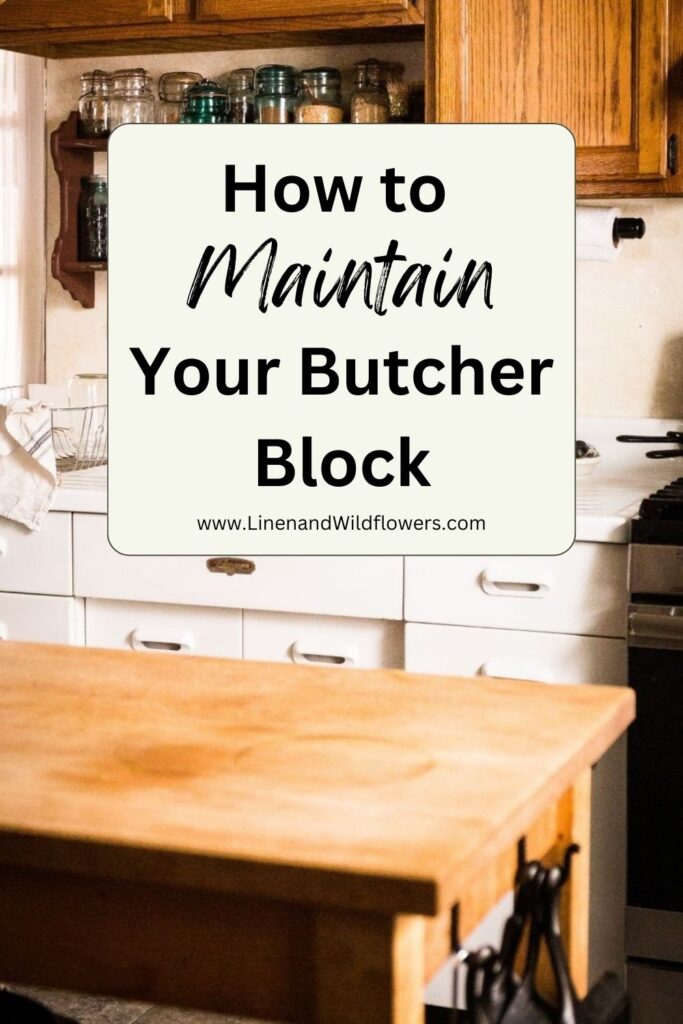Wood butcher blocks are essential to your kitchen, providing extra workspace and warmth. However, it is vital to maintain your butcher block to protect the wood, and it is important to keep it clean and sealed.
My maple butcher block is my workhorse in the kitchen. We use it for everything, from food preparation and kneading bread to serving buffets when we host functions in our home. With all the wear and tear from use, it is essential that we maintain and care for it so it will last for a lifetime. By using a commonly used household product like mineral oil, you can maintain your butcher block in just a few easy steps.
Preparing food daily can cause a lot of wear and tear on your butcher block. You must maintain it to prevent it from drying out, cracking, and splintering. If you take the time, about once a month, to clean and oil your butcher block, it will last a lifetime.

As an Amazon Associate, I earn from qualifying purchases, and this post contains affiliate links to products I love ♥ See my full disclaimer here!
If you’ve invested in the timeless beauty of wood countertops, particularly the classic butcher block, you’re likely already acquainted with the importance of regular maintenance. Preserving the natural allure of your butcher block not only enhances the aesthetics of your kitchen but also ensures its longevity.
One of the best ways to keep your wood surface in top condition is to use mineral oil. This simple yet effective solution is what I swear by for maintaining my own butcher block. Let me guide you through the process and address some commonly asked questions to help you achieve the best results.
Why Mineral Oil?
Mineral oil, also known as butcher block or cutting board oil, is a food-safe option that penetrates deeply into the wood grain, providing hydration and protection. Unlike cooking oils such as olive or vegetable oil, mineral oil doesn’t turn rancid over time, making it an ideal choice for wooden kitchen items.
Tools Needed for Maintaining Your Butcher Block
- Food Grade Mineral Oil
- Clean Rag
- Paper Towels
- Mild Dish Soap
- Hot Water
Directions for How to Apply Mineral Oil
The most crucial step in maintaining and preserving your butcher block is wiping it down with mineral oil, which you can find in almost any store. Here’s what you need to know to maintain your butcher block properly. All it takes is a scrub brush, hot, soapy water, food-grade mineral oil & a lint-free rag (I use a tea towel).
- Scrub the entire surface of your wood butcher block with hot, soapy water and let it dry for 15-20 minutes.
- Once your butcher block is completely dry, pour some food grade mineral oil into a few areas.
- Rub your clean cloth in circles around the entire butcher block surface until completely coated.
- Wipe off any excess until it has penetrated into the wood.
- Let it dry,
Frequent Reapplication: For high-use areas such as kitchen islands or countertops exposed to direct contact with food, frequent reapplication may be necessary. Aim for weekly or bi-weekly oiling to maintain optimal water resistance and protection.
Tip: Because you need to let the oil penetrate, your best bet would be to oil it before going to bed and let it sit overnight or before leaving for your workday. Oiling your butcher block at least once a month will preserve its longevity. By caring for it properly, my butcher block is going strong after 20 years of wear and tear.

Don’t forget!
Oil your wooden utensils, Rolling pins, and cutting boards, too. This will preserve them for many years.
Food-Grade Mineral Oil: This is the top choice for butcher blocks and is the primary ingredient in commercial sealing products. Look for food-grade mineral oil in your local store or pharmacy. It will be in the laxatives aisle.
Shop this Post
Choosing the Right Food-Grade Oils for Your Butcher Block and Wood Utensils
When selecting the right kind of oil for your butcher block or wooden utensils, it is essential to choose a food-grade option that is safe for direct contact with food. Additionally, consider the specific characteristics of each oil, such as its odor, drying time, and water resistance, to determine which one best suits your needs. Regular maintenance with food-grade oils will help keep your wood surfaces looking beautiful and protected for years to come.
Here is a List of Oils you can choose from:
- Pure Tung Oil: Pure tung oil is extracted from the seeds of the tung tree. It is a natural drying oil that forms a durable and water-resistant finish. It’s a great option for those looking for a natural and non-toxic solution.
- Walnut Oil: Made from roasted walnut kernels, walnut oil is another food-safe option for treating wood surfaces. It offers good penetration and leaves a beautiful, rich finish. However, it tends to go rancid over time.
- Coconut Oil: Known for its antibacterial properties, coconut oil is a popular choice for oiling wood utensils and cutting boards. It is solid at room temperature but melts easily upon contact with the wood, providing excellent moisture protection. This oil can go rancid over time, so this is something to consider.
- Raw Linseed Oil: Derived from flaxseed, raw linseed oil is a non-toxic option that penetrates deep into the wood, providing long-lasting protection. It is essential to use raw linseed oil, as boiled linseed oil contains additives that may not be food-safe.
- Olive Oil: While olive oil is commonly found in kitchens and can be used in a pinch, it is not as effective as other options due to its tendency to turn rancid over time. If using olive oil, be prepared for more frequent reapplications.
- Jojoba Oil: Extracted from the seeds of the jojoba plant, jojoba oil is a natural wax ester that closely resembles the sebum produced by human skin. It is odorless, non-toxic, and provides good protection for wood surfaces.
- Beeswax and Mineral Oil Blends: Some commercially available products combine beeswax with mineral oil to create a protective sealant for wood surfaces. These blends offer the benefits of both ingredients, providing moisture protection and a shiny finish.

Commonly Asked Questions
Maintaining your butcher block doesn’t have to be a daunting task. With regular cleaning and mineral oil treatments, you can preserve its natural beauty and ensure it withstands the rigors of daily use. So, head to your local hardware store, grab a bottle of safe mineral oil, and give your wood countertops the love and care they deserve. Your kitchen will thank you for it!
Can I use other oils, such as coconut or walnut oil?
While coconut and walnut oils can offer some protection, they may not penetrate the wood as effectively as mineral oil. Additionally, they may turn rancid over time, affecting the smell and taste of your food.
How often should I oil my butcher block?
It depends on usage. For heavily used surfaces, weekly or bi-weekly application is suggested, while less frequently used areas may only need monthly attention. However, I only oil mine about once a month, which is fine.
Is mineral oil safe for food contact?
Yes, mineral oil is food-safe and commonly used for wooden kitchen items. It’s odorless, tasteless, and will not harbor bacteria.
Can I use mineral oil on an unfinished butcher block?
Absolutely! My butcher block is natural maple wood. Mineral oil is suitable for both finished and unfinished wood surfaces.
What if my butcher block has water damage or stains?
For water damage or stubborn stains, try using a mixture of lemon juice and hydrogen peroxide or a paste of baking soda and water. Just be sure to reapply mineral oil afterward to maintain the wood’s integrity.
Final thoughts…
Butcher block maintenance isn’t about oiling, though. Routine cleaning plays a crucial role in keeping your wood surface in top condition. A gentle scrub with warm water and a mild detergent is all it takes to remove any food stains or particles. And if you’re dealing with stubborn stains, a mixture of lemon juice and hydrogen peroxide works wonders.
Ultimately, maintaining your butcher block is all about consistency and care. With regular applications of mineral oil and a little TLC, your wood countertop will look beautiful for years. So, there are many more cozy evenings in the kitchen, surrounded by the warmth and charm of our beloved butcher blocks!
Update March 19, 2024
 If you want to follow along on our home restoration/renovation plans and all of our exciting antique & thrift finds, be sure to check out Linen and Wildflowers on Facebook, Instagram, and Pinterest! And don’t forget to sign up for our newsletter to receive updates.
If you want to follow along on our home restoration/renovation plans and all of our exciting antique & thrift finds, be sure to check out Linen and Wildflowers on Facebook, Instagram, and Pinterest! And don’t forget to sign up for our newsletter to receive updates.
5 Best Tips for Cleaning Kitchen Cabinets

